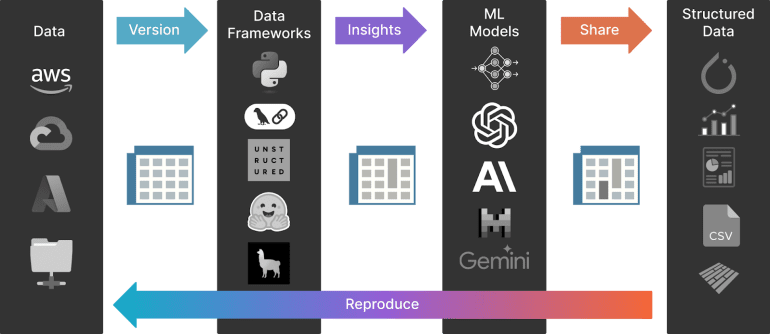- DVC.ai has launched DataChain, an open-source Python library designed for managing and curating unstructured data.
- DataChain uses AI and machine learning to enhance data with annotations and improve processing workflows.
- The library handles tens of millions of files, making it suitable for large-scale data projects.
- It integrates seamlessly with Python through Pydantic objects, offering an intuitive development experience.
- DataChain supports parallel processing, filtering, aggregating, and merging of datasets, and can convert data for machine learning use.
- The library features efficient data storage and retrieval via embedded SQLite databases and supports vectorized analytics.
- Use cases include evaluating AI-generated dialogues, automating response deserialization, performing complex analytics, annotating images, and curating datasets with AI-driven annotations.
- DataChain optimizes batch operations and out-of-memory computing for efficient data handling.
Main AI News:
DVC.ai has unveiled DataChain, an innovative open-source Python library designed to transform the management and curation of unstructured data. Leveraging cutting-edge AI and machine learning technologies, DataChain promises to enhance the efficiency of data processing workflows, offering significant benefits to data scientists and developers.
Key Features of DataChain:
- AI-Enhanced Data Curation: By integrating local machine learning models with large language model (LLM) APIs, DataChain enriches datasets with detailed annotations, providing structured data that adds value for subsequent analysis.
- Scalable Dataset Management: Capable of handling tens of millions of files, DataChain is ideal for extensive data projects. Its scalability supports efficient data processing and analysis, crucial for enterprises and researchers dealing with large datasets.
- Python Integration: Using strictly typed Pydantic objects rather than JSON, DataChain offers a more intuitive experience for Python developers. This compatibility ensures a smoother development process within the Python ecosystem.
Operational Capabilities
DataChain facilitates the parallel processing of multiple data files, supporting operations such as filtering, aggregating, and merging datasets. These operations can be seamlessly chained, enabling complex data processing workflows. The library allows datasets to be saved, versioned, and either extracted as files or converted into PyTorch data loaders, enhancing integration with machine learning workflows.
Advanced Data Handling
With Pydantic, DataChain serializes Python objects into an embedded SQLite database, allowing for efficient storage and retrieval. Vectorized analytical queries within the database improve performance by reducing the need for deserialization.
Use Cases:
- LLM Dialogue Evaluation: Assess AI-generated dialogues to ensure high-quality conversational agents.
- Automated LLM Response Deserialization: Simplify the handling of AI outputs by converting them into structured Python objects.
- Vectorized Data Analytics: Perform complex data analysis tasks efficiently.
- Image Annotation: Utilize local machine learning models to create labeled datasets for computer vision.
- Dataset Curation: Enhance dataset quality with AI-driven annotations for improved usability in machine learning.
Optimized Performance
DataChain excels in optimizing batch operations, such as parallel API calls and heavy batch processing, and supports out-of-memory computing. This optimization ensures efficient processing of even the largest datasets.
Conclusion:
The introduction of DataChain by DVC.ai represents a significant advancement in the field of data management and processing. By providing a scalable, Python-friendly solution with advanced AI and machine learning capabilities, DataChain meets the growing needs of enterprises and researchers handling large datasets. Its ability to integrate with existing Python ecosystems and optimize complex data operations positions it as a valuable tool for enhancing data workflows and improving data quality. This innovation is likely to drive increased adoption of advanced data processing techniques and could set new standards for efficiency in the industry.

